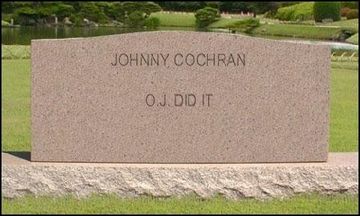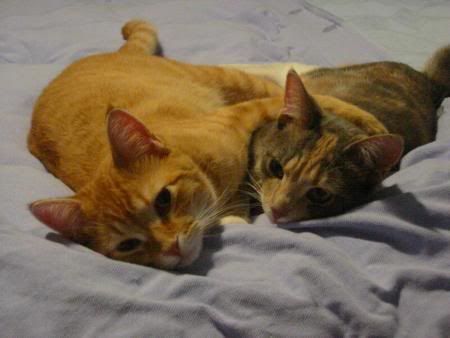Plagiarist Note, June 2005: Apparently, and sadly, this article is nothing but a fake, written by somebody with too much time on their hands and a desire to mess with people. I feel bad for having posted it, and stupid for having bought into it, especially with my comments below. I leave it up here because it was an interesting read (and very well written, in Pete's style of speaking), but none of the comments below are actually from Pete Townshend.
Another post that nobody will care about. That's fine. A friend sent me the text of an interview that Pete Townshend recently did with
Uncut Magazine.
I've read countless interviews with Pete between 1965 and the present. Most of them are short, many of them feature a moody Pete who changes his thoughts at the drop of a hat, but once in a blue moon, he gives an interview that cuts through the bullshit. This is an honest Pete Townshend, verbalizing many of the speculations that have been swirling in my head about his current state. It's one of doubt and insecurity about his place in rock history. He may be a superstar, but his question about whether or not he will ever escape his windmilling shadow is one that is universal. We all wonder, from time to time, whether we'll ever be able to do what we did "back then."
This is a fascinating look behind blue eyes.
WHO'S THIS?To see him at his desk, guitarist Pete Townshend casts the image of
anything but an iconic rock legend. He has an understated air of
dignity, one more reminiscent of a barrister or corporate executive.
Long gone are the days of being the angry young man penning rock
operas and rock anthems, replaced instead by a quiet gentleman
engaged in a multitude of creative outlets, including theater
production and sailing. Despite his demeanor and prevailing sense of
contentment, he remains one of the most visible and vocal figures in
the rock world since the 1960s, firmly planted at the forefront with
his articulate writing, slashing power chords and bedeviling
persona. Townshend is as well known for creating classic songs as he
is for destroying the guitars he played them on. Now entrenched in
middle age, the erstwhile purveyor of auto-destruction shares his
thoughts on his band's past, present and future, with his usual
candor and wry sense of humor.Interview: Trevor Langham Image: Edward Maxwell
UNCUT: Having lasted into a fifth decade as a touring and recording artist, how do you view your personal musical legacy and that of the Who?Townshend: One of the struggles I've had over my career has been
differentiating myself as an individual from my role in the Who. For
better or worse, I've become associated with the band almost
exclusively and my earliest solo efforts were attempts to establish
my own identity. I think my work away from the group has been the
most rewarding as I was able to capture personal sentiments through
songs far more effectively. Obviously the Who was a considerably
more successful financial endeavor, so from a purely business
standpoint I'd say that my contributions as a band member will stand
the test of time. I'm much happier with my catalogue as a solo
artist, as there were some weaker moments with the Who.
Which moments specifically?The '80s incarnation of the band was dreadful; we were grasping for
our past and came up short. In retrospect we should have simply
walked away after Keith's death since there was no way we could
replicate what we had been. And selecting Kenney Jones as a
replacement was a terrible error in judgment. We knew him from his
Small Faces days and made the choice based upon emotion and loyalty
rather than on practicality. A good time keeper, but not what we
needed at that point. And soldiering on as we did, we were held to
the same standards by fans, which we were obviously unable to
attain. The two albums were futile attempts to reinvent ourselves as
a band, to stay current but to keep one foot in our storied past.
Our mid '70s output was not particularly impressive either, but for
a different reason. By 1972 we had reached the level of stardom that
we'd always dreamed of, and we became somewhat comfortable with our
senses of self importance. Creatively I peaked with 'Quadrophenia',
so our run of quality material was over by '74, perhaps '75. I mean
is there anyone sitting around playing 'Squeeze Box' and telling
their neighbors it's a memorable Who song? By 1975 we were known
more for our live shows, so the drop off in studio work was easier
to mask. People who wanted albums followed the Rolling Stones,
people who wanted concerts followed the Who.
What of the 1989 Reunion Tour and subsequent shows throughout the next decade?The 25th Anniversary tour was designed around celebrating what the
Who was and had meant musically, and not on vanity. We'd taken
sufficient time off so that we were able to come together without
much of the baggage that had weighed us down, and coexist on stage.
It gave me a chance to revisit my love/hate relationship with the
Who entity; I found that I missed it dearly after spending so long
trying to escape from its clutches. I also enjoyed the diversions of
bringing 'Tommy' to Broadway and my own 'Psychoderelict' project.
The subsequent Who tours found us contented with each other's
company as we'd never been, and it showed when we played. There were
some pissy moments between us, but the '96 gigs were some of the
finest we'd played since the early 1970s and the Concert for New
York spoke for itself. I don't recall a show when John, Roger and
myself were ever better.
Is the state of disenfranchisement amongst the youth culture similar now to what it was in the early 1960s?Conceptually it is because there is so much in the world to fear.
Realistically however today's youth have considerably more than we
did in post war Europe. That's why I object to current bands
gratuitously trumpeting the teen angst mantra. You drive a luxury
SUV and sell tens of millions of albums…How can you be taken
seriously whining about how difficult it is being 25? As far as fans
go, when you attend University and have a cell phone, lap top, I-Pod
and platinum charge card it's impossible to hope you die before you
get old. Forty years ago we were scared of what we faced the next
day with joblessness and a host of socio-political ills. If we
protested or questioned authority, we'd be beaten by the police and
locked up, so we either fought the system outwardly and suffered the
consequences or attacked it through artistic expression. Today you
have lawyers circling at every rally looking for human rights
violations and excuses to file lawsuits, so everyone can speak their
mind free from the threat of persecution. If I were a teenager today
there is no way I could justify writing what I did in the
early '60s, I'd have too many opportunities and too soft a life.
What do you think of the recent covers of Who material?Petra Haden is an enormously gifted artist and her version of 'Sell
Out' was pure genius. She deserves a great deal of credit for even
taking on such a project, let alone pulling it off so beautifully.
I've been contacted by U2 about a charity album that they are
putting together in which they'd like to cover 'The Kids Are
Alright', and I think that will turn out well. The only other cover
that comes to mind is 'Behind Blue Eyes' by that Durst fellow.
Suffice it to say that when I first heard it I thought of the time I
clubbed Abby Hoffman. It was an embarrassing effort, and one that
discredits a fine song.
How do you view critics' assertions that you sold out by licensing Who songs for various adverts?I've heard more complaints about licensing than praise, but what
people fail to realize is that they're my fucking songs. Marketing
is an inescapable part of the music business now, and anyone who
refuses to believe that and stands on principle will die a pauper.
The greatest demographic of consumers is that of my contemporaries,
individuals who grew up listening to the Who and the Beatles and the
Kinks, and Madison Avenue understands the importance of selling to
them through familiarity. If Nissan believes that sales will
increase because buyers enjoy the images associated with
Quadrophenia, then I'd be a fool to turn down their money. And I
don't accept the argument that artists somehow owe something to
their fans by keeping songs sacred. Rubbish…We've all sold out in
certain ways and art has always gone to the highest bidder. Is
Picasso somehow less of a master because one of his paintings sold
at Sothebys for millions of pounds? No more than I am for selling my
work or Mick Jagger for selling his work at a corporate auction. If
you disagree, then don't buy a Nissan truck or Apple computer, and
go write your own songs.
You wrote and recorded two new songs for the greatest hits album 'Then and Now', although there have been rumors of a full length album circulating for several years. Will there be a new Who album forthcoming?At this point all plans for an album have been put on indefinite
hold. Much of that has to do with record company logistics, but some
of the blame is attributable to myself. I am once again plagued by a
strong sense of discomfort associated with creating new material for
the Who. That has more to do with my own internal struggle vis a vis
what the band is or is not than with any creative difficulties. The
songs written for 'Then and Now' were both a blessing and a curse;
they proved that I could still write and record with Roger under the
Who banner and be accepted as the Who proper, but also evidenced a
disconcerting loyalty amongst our fan base. I felt that the songs
were accepted irrespective of their quality, and simply because they
were "Who songs" which led me to question the integrity of what we
were doing. If I recorded an album of poetry readings and called
it 'Who's Poems' it would sell extremely well because Who fans have
not had a new record in over twenty years and would purchase
anything we released. That realization is a sobering acknowledgement
of power and control, one that I am extremely uncomfortable with.
Roger's attitude is different, he will always be the Who's
staunchest supporter, but his commitment is not enough to allay my
feelings of being a fraud.
If you won't be penning a new album, what can Who fans expect from you in the near future?(Laughs) The unexpected! Currently I'm working on numerous projects,
some for the stage, others for the recording studio, so I can't say
definitively what will be next or when. What I can say is that it
will not be a Who album. Roger and I are planning some selected
engagements together…if they do well and we're happy with our
performances, there may be a CD or DVD released by year end, but
it's still too early to tell.
Where does the Who stand at present?
In a perplexing yet fascinating state of limbo. The Who is the music
equivalent of an insect frozen in amber. Roger and I can go out
anytime we like with a band of musicians and call ourselves the Who.
We're able to do that simply because we're still competent enough to
play songs true to the original form. Technical abilities aside,
what you see is not really the Who but rather a moment in time being
revisited in the best and only way possible. We had toyed with the
idea of changing the name to the Who 2 or something similar, but my
concern was that it would trivialize what we've being doing for
forty years, making us a parody of our former selves. I have no
interest in becoming the obese Las Vegas Elvis, doing windmills and
going deaf. We toured after losing John and it was extremely
difficult even seeing concert posters with the Who name…We knew that
we were down to 50% and that it was somehow inauthentic to market
the band as the Who. Yet we did it, and did it fairly well. The
shows that Roger and I play in the near future will be under a
different name. To do otherwise would be disingenuous.
If you could pinpoint a single high mark in your career, what would it be?That's an interesting question…I'd say 'Empty Glass', well no…As a
solo artist I think 'White City' was an accomplishment in that I was
very satisfied with my writing and production. During 'Empty Glass'
my life was coming apart and my mind was in a perpetual state of
conflict. The album was good, but there are too many bad memories
associated with it to call it a watershed moment. 'White City' was
considerably better content wise, and I was not nearly as tormented
with myself. As far as the Who…most people would say 'Tommy'
or 'Who's next' but those are more group accomplishments. I think my
performance in the 'Tommy' film was quite good, (laughs)…Perhaps the
mini-opera 'A Quick One' as I was so naïve at the time to believe
that I could take rock music and make it into something grandiose.
Do you have any significant regrets associated with your career?
Mainly that I was not as productive as I should have been at various
points over the years. Self indulgence is enjoyable on a moment to
moment basis, but looking back I wish I'd done less chemicals and
more writing and playing. In some ways I'll continue to be haunted
by my inability to live comfortably as Pete Townshend of the Who…I
feel that I let my band mates down on occasion, personally and
artistically. When we were going off to do our respective solo
albums, I should have been more supportive, particularly with Keith.
He fancied himself as a potentially talented lounge singer, but I
never thought he was serious as his vocals were plain awful. Perhaps
if I'd put more stock in his efforts he'd have lasted longer than he
did, and I'm troubled by that to this day…I classify it as lingering
band induced guilt.
Are there any artists that you presently follow?The usual suspects, I suppose. I'm anxious to hear the new Oasis
album, although I have something of a vested interest in them as
they stole my drummer! (laughs). Jet is also a band that I've
enjoyed, and I recently heard a group from New York, Acquiesce, who
I was extremely impressed by. Those are a few acts that I keep in my
CD player.
One final question; when the day comes, what would you like your epitaph to read?
Here lies Pete Townshend…quite comfortably…







